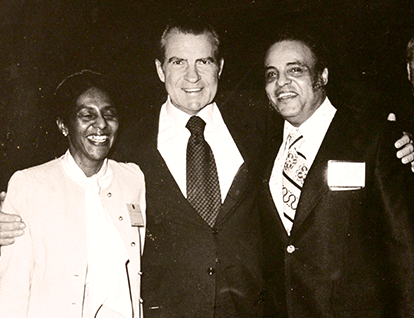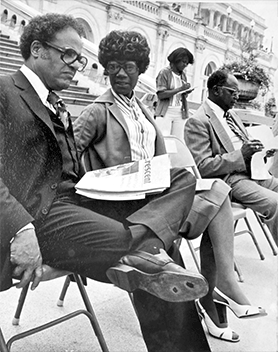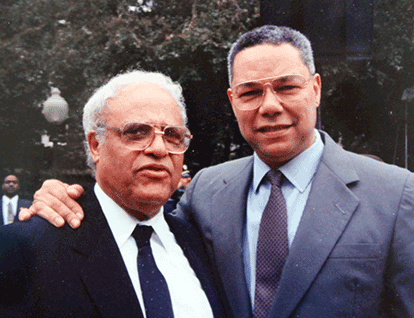Benjamin L. Hooks and Partisan Politics
By Joshua D. Farrington, PhD

and Benjamin Hooks.
The legacy of Benjamin Hooks is as wide-ranging as it is lasting. It’s a legacy that includes his role as a powerful agent of social and political change in Memphis, as a power broker in Tennessee state politics, as a groundbreaking federal official, and as the leader of one of the most preeminent organizations in U.S. history, the NAACP. To those unaware of the unique political history of Memphis, one aspect of his life might seem strange when compared to the pantheon of civil rights leaders Hooks joins—his decades as an active member of the Republican Party.
Within the political context of 1950s-era Memphis, Hooks’ Republican affiliation was not a paradox; it was the norm. Since the 1910s, black Republicans like businessmen Robert R. Church, Jr. and George W. Lee had forged ties between black voters in Memphis and the state and national Republican Party. Indeed, Church was one of the most powerful and influential Republicans, including white Republicans, in the entire South. When Hooks returned to Memphis after graduating from law school in 1948, he immediately joined Church’s Republican machine, which was, in Hooks’ words, “beating the drum for equality.” He would soon after play a major role in increasing black voter registration in the city to over 200,000 by the 1950s.
Working his way up the ranks of the city’s Republican machine, Hooks campaigned alongside presidential candidates Dwight Eisenhower and Richard Nixon during their visits to Memphis in 1952 and 1960. Not only did the local Republican organization provide an avenue for black leaders like Church and Hooks to tap the political power of black residents, but Hooks believed that a strong Republican Party in the South with ties to black voters offered a meaningful alternative to a Democratic Party dominated by southern segregationists.1

By the early 1960s, however, a significant number of conservative whites in Memphis had joined the party in hopes of securing the presidential nomination of Barry Goldwater, a like minded Republican who opposed the Civil Rights Act of 1964. Hooks joined Lee in contesting what he believed was an illegal attempt by anti-civil rights forces to wrest control of the party from African Americans. Appearing before the Republican National Convention in San Francisco, Hooks argued that conservative whites had stolen the party through a systematic campaign of intimidation and undemocratic methods, which included locking black leaders out of meetings and moving black precinct locations to the segregated Peabody Hotel during the primary elections. Though some prominent Republicans, such as New York governor Nelson Rockefeller, publicly sided with Hooks on the convention floor, his opponents prevailed. By the end of 1964, Hooks officially joined the ranks of the Democratic Party.2
It’s important to note that even as a Republican, Hooks recognized the need for black voters to judiciously consider their votes in a way that eschewed partisan interests, and instead reached across party lines to pressure both parties to compete for black votes. Even when he was one of the most recognizable Republicans in Memphis, Hooks endorsed moderate Democrats who he believed could be allies in the struggle for civil rights, including Estes Kefauver and Al Gore, Sr.3 Soon after Hooks’ switch to the Democratic Party, Tennessee’s Democratic governor, Frank Clement, made him the state’s first African American judge since Reconstruction. Just as he had done within the infrastructure of the Republican Party in the 1950s through determination, political savvy and meaningful connections to black grassroots leadership, Hooks just as quickly moved up the ranks of the state’s Democratic establishment in the 1960s.4
As a Democrat, Hooks continued to embrace bipartisan cooperation when it had potential to advance his civil rights agenda. Central to his approach was his emphasis that black voters should not be so rigid in their partisanship as to alienate potential allies. Hooks remained friends through the 1970s with moderate Republicans, including black Republican holdouts like Lee as well as U.S. Senator Howard Baker. He maintained even into the waning years of his life that without Republican allies like Baker, “the civil rights movement would have been set back years.” This ability to secure strategic alliances across the partisan spectrum helped land Hooks one of the most powerful federal positions an African American had ever obtained—a post as a commissioner on the powerful Federal Communications Commission—in 1972.5

Upon succeeding Roy Wilkins as the executive director of the NAACP in 1977, Hooks continued to reach out to sympathetic Republicans, such as activist Ralph Neas and the two-term black Republican senator from Massachusetts, Edward Brooke.6 At the helm of the nation’s foremost civil rights organization, Hooks often appeared before Republican audiences to advocate for racial justice. He similarly was not afraid to chastise Democratic leaders for taking black votes for granted.7 Unlike other civil rights leaders, Hooks also maintained a relationship with black Republicans. He personally implored sympathetic black delegates at the 1984 Republican National Convention to become voices of conscience within the conservative Reagan-era. As late as 2003, Hooks’ approach remained the same, as he praised black Republicans like Colin Powell, the first African American U.S. secretary of state, for supporting affirmative action, and warned black Democrats to avoid becoming so partisan that they gave their party a pass on ignoring black voters.8
Hooks’ fifty year commitment to a pragmatic political strategy that transcended partisan lines is important to recognize in the hyper-partisan era of the twenty-first century. His life provides an example of the possibility of remaining steadfast to the cause of civil rights without compromising core principles, while also forging alliances across party lines with unlikely allies for the ultimate goal of a more democratic, equitable, and free America.

Joshua D. Farrington is a professor of African/African American studies at Eastern
Kentucky University and author of “Black Republicans and the Transformation of the
GOP.” His research interests include African American history, The Long Civil Rights
Movement, Black Political Thought, 20th century U.S.
Citations
- Benjamin Hooks with Jerry Guess, The March for Civil Rights: The Benjamin Hooks Story
(Chicago: American Bar Association, 2003), 345-346; “Memphis Negroes Names,” New York
Times, October 4, 1952; George W. Lee, “Profile of Two Candidates in a Southern Background,”
October 5, 1960, Folder 2, Box 4, George W. Lee
Collection, Memphis/Shelby County Public Library; Cynthia Griggs Fleming, Yes We Did? From King’s Dream to
Obama’s Promise (Lexington: University Press of Kentucky, 2009), 117. - G. Wayne Dowdy, Crusades for Freedom: Memphis and the Political Transformation of the American South (Jackson: University Press of Mississippi, 2010), 18; Joshua D. Farrington, Black Republicans and the Transformation of the GOP (Philadelphia: University of Pennsylvania Press, 2016), 131-133.
- Hooks with Guess, 346.
- Kyle Longley, Senator Albert Gore, Sr.: Tennessee Maverick (Baton Rouge: Louisiana State University Press, 2004), 200.
- Hooks with Guess, 95-96.
- Mary Frances Berry, And Justice for All: The United States Commission on Civil Rights and the Continuing Struggle for Freedom in America (NY: Alfred A. Knopf, 2009), 192.
- “Civil Rights Leader Says G.O.P. Can Win Black Vote,” Morning Record and Journal, July 22, 1978.
- “Blacks Appear to Play a Small Role in GOP’s Convention in Dallas,” Jet, August 27, 1984; Fleming, 120.
